
The deadline for action recommended by the Mass Casualty Commission for the worst mass shooting in Canadian history is fast approaching, and the federal and Nova Scotia governments are under pressure to act. The inquiry called on the two levels of government to address the «unmet need for mental health, grief and bereavement supports» in northern and central Nova Scotia, where 22 people were shot dead on April 18-19, 2020. The inquiry found the government’s inaction led to a prolonged «public health emergency» in the counties where the killings occurred.
One of the main recommendations of the commission was that the federal and Nova Scotia governments fund a multidisciplinary team of health professionals who can provide urgent support, and then transition to a long-term strategy. However, it remains unclear what, if anything, will happen when the May 1 deadline arrives. The registered social worker who was the province’s grief and bereavement coordinator in northern Nova Scotia three years ago, Serena Lewis, drafted a provincial grief strategy, but the plan was shelved.
The inquiry concluded that the government’s inadequate support led to a healing deficit and broken trust. It also found that the long-term implications include «the potential to lead to further cycles of violence and trauma.» The federal government’s new Wellness Together Canada portal and the PocketWell app provide free, round-the-clock access to support, but there is no reference to the commission’s recommendations or the May 1 deadline. The province’s poor response could result in more cases of anxiety, depression, post-traumatic stress disorder and suicidal thoughts.
Alec Stratford, executive director of the Nova Scotia College of Social Workers, said the province has moved too slowly, and it takes time to build these systems. He fears that the sense of grief many Nova Scotians are still feeling has been complicated by the traumatic nature of what happened and the social isolation caused by the pandemic. Lewis said that if the commission’s recommendations are not mobilized, then where is the accountability?